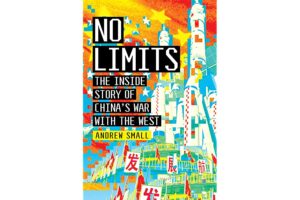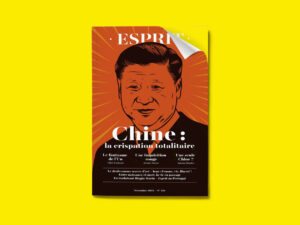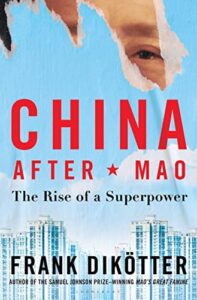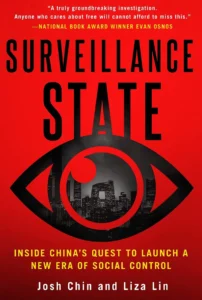Xi Jinping wants to reshape the world order in a way that would please autocrats. He presents China’s authoritarian model as a plausible alternative to the West, notes Roger McShane, China Editor at The Economist. And he has more resources at his disposal than any despot in history. Yet China is also weaker than it might otherwise be, thanks to Mr Xi’s own choices.
“It is clear that Xi sees China having entered a period primarily of struggle in the international arena rather than a period of opportunity,” according to Andrew Small (above), author of “No Limits: The Inside Story of China’s War with the West.”
 “We are not just engaged in a U.S.-China great power rivalry,” he suggests. “This is now really a rivalry between systems. The Chinese Communist Party has understood it in these terms for some time,” he said, and “the U.S. has started to wake up to the idea.”
“We are not just engaged in a U.S.-China great power rivalry,” he suggests. “This is now really a rivalry between systems. The Chinese Communist Party has understood it in these terms for some time,” he said, and “the U.S. has started to wake up to the idea.”
European businesses are becoming increasingly concerned about the overriding ideological impact on the business environment in China, and they are looking to Beijing for a “real booster” to restore business confidence in the country, the South China Morning Post reports.
“[We worry that] China is leaving this kind of successful pathway of opening up and reform and actually has a more politicised environment,” said Joerg Wuttke, president of the European Union Chamber of Commerce in China. He reiterated a belief that the chamber expressed in its annual position paper in September, saying: “‘Ideology trumps the economy’ basically sums up the worries we have.”
China often deploys its military and party members in moments of crisis, reflecting the party’s deep-seated faith in the power of ideology and loyalty over material interests, Chang Che and John Liu report for the Times. During the Shanghai lockdowns this spring, China called on thousands of medics in the People’s Liberation Army and party cadres as part of its full-throated pandemic response.
 And indeed, by some measures the CCP has never been stronger, writes Chloé Froissart in Esprit. ‘Xi has amassed more power than any leader in the history of the PRC’, quashing internal opposition with restrictive legislation and surveillance. But this centralization comes at a cost. An ‘obsession with control and political loyalty is reducing the regime’s flexibility’, stifling innovation and leaving the party at risk of atrophy. The ongoing real-estate crisis and resentment at harsh lockdowns have revealed the ‘gap between the regime’s buzzwords and reality’.
And indeed, by some measures the CCP has never been stronger, writes Chloé Froissart in Esprit. ‘Xi has amassed more power than any leader in the history of the PRC’, quashing internal opposition with restrictive legislation and surveillance. But this centralization comes at a cost. An ‘obsession with control and political loyalty is reducing the regime’s flexibility’, stifling innovation and leaving the party at risk of atrophy. The ongoing real-estate crisis and resentment at harsh lockdowns have revealed the ‘gap between the regime’s buzzwords and reality’.
Does all this mean China is a totalitarian state? Eurozine asks:
The answer, write Froissart and Kevin Cadou, is a resounding yes. They cite Claude Lefort’s more flexible definition of totalitarianism: a regime that can accommodate dissent and variability, but that fantasizes about creating ‘an internally transparent society that can modify and control any of its components at will’ and takes steps towards that goal. The test of totalitarianism is ‘the degree to which the sphere of civil society and the state have been gradually restricted and absorbed by the party and its supreme leader’.
 Although there are clearly limits to Russia and China’s “no limits” quasi-alliance, each appears bent on revising what they consider a Western-dominated global order, notes Richard Fontaine, CEO of the Center for a New American Security.
Although there are clearly limits to Russia and China’s “no limits” quasi-alliance, each appears bent on revising what they consider a Western-dominated global order, notes Richard Fontaine, CEO of the Center for a New American Security.
In this new era, Russia and China represent neither chess pieces to be moved through assiduous acts of wise statesmanship nor great-power challengers that can be handled effectively without American activism, he writes for Foreign Affairs. They are, rather, enduring and differentiated challenges that must be managed simultaneously. This is the crux of the United States’ strategic conundrum.
 Westerners must be careful not to predict an outcome—the Communist Party’s collapse—just because it would be to their liking, cautions The Economist’s McShane. Even a weaker Chinese economy will be among the world’s largest. The state can mobilise vast resources in strategic areas, such as producing semiconductors or weapons. …. China’s continued ascent is not inevitable, but neither is its decline.
Westerners must be careful not to predict an outcome—the Communist Party’s collapse—just because it would be to their liking, cautions The Economist’s McShane. Even a weaker Chinese economy will be among the world’s largest. The state can mobilise vast resources in strategic areas, such as producing semiconductors or weapons. …. China’s continued ascent is not inevitable, but neither is its decline.
China’s overt, international propaganda apparatus doesn’t operate solely in open and competitive media markets, notes Kevin Sheives, Deputy Director at the NED’s International Forum for Democratic Studies:
It is increasingly bolstered by a variety of sophisticated, covert activities such as paying influencers on platforms like YouTube, amplifying official state media and PRC diplomats through fake social media accounts, and censoring foreign researchers and journalists through cyberbullying or denying safe access to China as leverage. Tracking, analyzing, and publicizing these covert campaigns can help blunt the impact of state-based propaganda and build resilience among the public to foreign influence operations…. Journalists should also take advantage of open source investigative courses on China, such as one offered at the Center for Advanced China Research.
The solution to information disorder must go above and beyond offering a more competitive alternative through journalism and fact-checking initiatives, Sheives suggests.
 Frank Dikötter’s China After Mao blasts several holes in the notion that a Marxist-Leninist system can ever bring real reform. The new dictator’s reign will not end well, any more than that of his hero, Chris Patten writes for the New Statesman.
Frank Dikötter’s China After Mao blasts several holes in the notion that a Marxist-Leninist system can ever bring real reform. The new dictator’s reign will not end well, any more than that of his hero, Chris Patten writes for the New Statesman.
In Surveillance State, Josh Chin and Liza Lin, two experienced Wall Street Journal reporters, explain how digital technology is being bent to the challenge faced by every Chinese ruler in history: how to manage China’s large population over time, Isobel Hilton adds. From the first experiments in digital control in Xinjiang to the comprehensive penetration enabled by Covid, China’s digital panopticon represents a sobering warning to citizens everywhere.
EU firms in China increasingly worried about impact of ideology on business https://t.co/wEK48rUu5B via @scmpnews
— Democracy Digest (@demdigest) November 18, 2022







